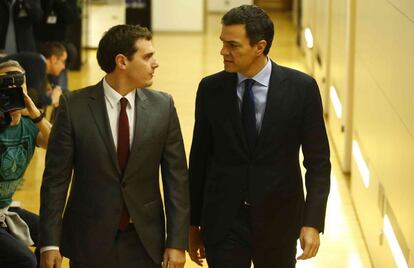PSOE and Ciudadanos agree to start negotiating government program
Teams from both parties to start hammering out action plan on five major issues

Socialist leader Pedro Sánchez, who is working to secure enough political support to get himself named Spain’s new prime minister, on Thursday met with the head of emerging party Ciudadanos and agreed to start negotiating a hypothetical governing program.
Negotiating teams from both parties will meet on Friday to hammer out an action plan based on five major issues: social policy and job creation, democratic regeneration, economic and fiscal policies, constitutional reform, and foreign policy with a special focus on EU relations.
“If the PP and PSOE do not drop this cold war, there will be no agreement”
“Ciudadanos seeks consensus, reforms and a calendar with execution deadlines,” said the party’s leader, Albert Rivera, following the meeting.
“We’re not talking about a possible investiture, we’re talking about a government that will govern,” added the head of a party that came in fourth at the election on the back of the message that the changes it seeks for Spain cut across the left-right divide. “This is not just arithmetic for an investiture vote.”
The investiture session will likely take place in three weeks to a month after the Socialist leader asked Congress for extra time to forge alliances.
Ever since an inconclusive election on December 20 yielded a hung parliament, parties have been attempting to cut deals that will enable one or more of them to form a government.
Although the election was won by the conservative Popular Party (PP) with 123 seats, the incumbent Mariano Rajoy has failed to attract enough support for a congressional majority, and refuses to bid for reinstatement in the knowledge that he will be voted down at the investiture session.
“We’re not talking about a possible investiture, we’re talking about a government that will govern”
Given this refusal, King Felipe VI – following protocol laid out in the 1978 Constitution – on Tuesday asked the runner-up in the election, Pedro Sánchez, to try for the post himself. His party secured 90 seats at the election, while Ciudadanos earned 40, with 176 needed for a majority.
The Socialist leader now has several possibilities before him, one of which is a grand coalition with the PP – but he has repeatedly said that this will not happen because of the conservatives’ long record of corruption.
Another option, which Podemos has put to him, is a three-way coalition between the Socialists, the anti-austerity party and the small United Left group. Podemos leader Pablo Iglesias is seeking the post of deputy prime minister in this “government of change.”
But so far, Sánchez seems to favor a broader alliance of “progressive” forces that could include regional parties, as long as they do not support a breakaway from Spain, which automatically leaves out several Catalan and Basque groups.
Meanwhile, Ciudadanos has also been in touch with the PP to launch parallel talks with the conservatives. Rivera feels that Spain’s two main parties are fated to find common ground despite their discrepancies.
Ciudadanos has said it will not join the executive, and that the most it will do is abstain at the investiture vote to let Sánchez become PM
“If the PP and PSOE do not drop this cold war, there will be no agreement,” he said on Thursday.
The Socialists and Ciudadanos face some discrepancies of their own, including the single job contract type defended by Rivera, which Sánchez criticized harshly during the campaign race.
Ciudadanos is trying to mediate to achieve a transition government led by the PSOE and supported from the outside by its own votes and those of the PP. Rivera has said his party will not join the executive, and that the most it will do is abstain at the investiture vote in order to let Sánchez become prime minister.
But this move also requires an abstention from the PP or Podemos, both of which are disinclined to comply.
English version by Susana Urra.
Tu suscripción se está usando en otro dispositivo
¿Quieres añadir otro usuario a tu suscripción?
Si continúas leyendo en este dispositivo, no se podrá leer en el otro.
FlechaTu suscripción se está usando en otro dispositivo y solo puedes acceder a EL PAÍS desde un dispositivo a la vez.
Si quieres compartir tu cuenta, cambia tu suscripción a la modalidad Premium, así podrás añadir otro usuario. Cada uno accederá con su propia cuenta de email, lo que os permitirá personalizar vuestra experiencia en EL PAÍS.
En el caso de no saber quién está usando tu cuenta, te recomendamos cambiar tu contraseña aquí.
Si decides continuar compartiendo tu cuenta, este mensaje se mostrará en tu dispositivo y en el de la otra persona que está usando tu cuenta de forma indefinida, afectando a tu experiencia de lectura. Puedes consultar aquí los términos y condiciones de la suscripción digital.








































